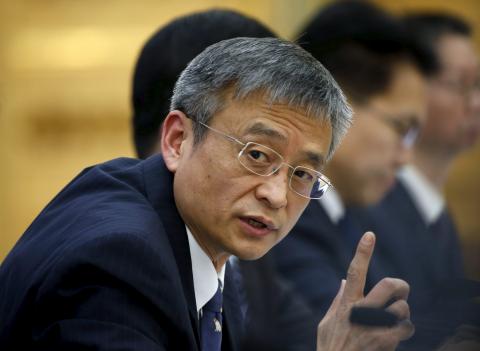China’s legislature approved an antiterrorism law on Sunday after months of international controversy, including criticism from human rights groups, business lobbies and US President Barack Obama.
Critics had said the draft version of the law used a recklessly broad definition of terrorism, gave the government new censorship powers and authorized state access to sensitive commercial data.
The Chinese government argued that the requirements were needed to prevent terrorist attacks. Opponents countered that the new powers could be abused to monitor peaceful citizens and steal technology secrets.

Photo: Reuters
In the end, the approved law, published by state media, dropped demands in the draft version that would have required Internet companies and other technology suppliers to hand over encryption codes and other operating sensitive data for official vetting before they went into use. However, the law still requires that companies hand over technical information and help with decryption when the police or state security agents demand it for investigating or preventing terrorist cases.
Telecommunication and Internet service providers “shall provide technical interfaces, decryption and other technical support and assistance to public security and state security agencies when they are following the law to avert and investigate terrorist activities,” the law stipulates.
“Not only in China, but also in many places internationally, growing numbers of terrorists are using the Internet to promote and incite terrorism, and are using the Internet to organize, plan and carry out terrorist acts,” Standing Committee of the Chinese National People’s Congress criminal law expert Li Shouwei (李壽偉) said at a news conference in Beijing.
The approval by the legislature, which is controlled by the Chinese Communist Party, came as Beijing has become increasingly jittery about anti-government violence, especially in the ethnically divided region of Xinjiang in western China, where members of the Uighur minority have been at growing odds with the authorities.
Chinese leaders have ordered security forces to be on alert against possible terrorist attack of the kind that devastated Paris in November.
Over the weekend, the shopping neighborhood of Sanlitun in Beijing was under reinforced guard by People’s Armed Police troops after several foreign embassies, including that of the US, warned that there were heightened security risks there around Christmas.
Human rights groups have warned that the law would give even more intrusive powers to the Chinese government, which already has broad, virtually unchecked authority to monitor and detain citizens and to demand information from companies and Internet services.
In an interview with Reuters in early March, Obama criticized the proposed legislation and similar initiatives by the Chinese government and warned that technology companies would not go along with the intrusive demands laid out in the draft law.
Li said that the new law was no reason for multinationals to be alarmed.
“These rules will not affect the ordinary business activities of the firms concerned,” he said.

A magnitude 7.0 earthquake struck off Yilan at 11:05pm yesterday, the Central Weather Administration (CWA) said. The epicenter was located at sea, about 32.3km east of Yilan County Hall, at a depth of 72.8km, CWA data showed There were no immediate reports of damage. The intensity of the quake, which gauges the actual effect of a seismic event, measured 4 in Yilan County area on Taiwan’s seven-tier intensity scale, the data showed. It measured 4 in other parts of eastern, northern and central Taiwan as well as Tainan, and 3 in Kaohsiung and Pingtung County, and 2 in Lienchiang and Penghu counties and 1

FOREIGN INTERFERENCE: Beijing would likely intensify public opinion warfare in next year’s local elections to prevent Lai from getting re-elected, the ‘Yomiuri Shimbun’ said Internal documents from a Chinese artificial intelligence (AI) company indicated that China has been using the technology to intervene in foreign elections, including propaganda targeting Taiwan’s local elections next year and presidential elections in 2028, a Japanese newspaper reported yesterday. The Institute of National Security of Vanderbilt University obtained nearly 400 pages of documents from GoLaxy, a company with ties to the Chinese government, and found evidence that it had apparently deployed sophisticated, AI-driven propaganda campaigns in Hong Kong and Taiwan to shape public opinion, the Yomiuri Shimbun reported. GoLaxy provides insights, situation analysis and public opinion-shaping technology by conducting network surveillance

‘POLITICAL GAME’: DPP lawmakers said the motion would not meet the legislative threshold needed, and accused the KMT and the TPP of trivializing the Constitution The Legislative Yuan yesterday approved a motion to initiate impeachment proceedings against President William Lai (賴清德), saying he had undermined Taiwan’s constitutional order and democracy. The motion was approved 61-50 by lawmakers from the main opposition Chinese Nationalist Party (KMT) and the smaller Taiwan People’s Party (TPP), who together hold a legislative majority. Under the motion, a roll call vote for impeachment would be held on May 19 next year, after various hearings are held and Lai is given the chance to defend himself. The move came after Lai on Monday last week did not promulgate an amendment passed by the legislature that

AFTERMATH: The Taipei City Government said it received 39 minor incident reports including gas leaks, water leaks and outages, and a damaged traffic signal A magnitude 7.0 earthquake struck off Taiwan’s northeastern coast late on Saturday, producing only two major aftershocks as of yesterday noon, the Central Weather Administration (CWA) said. The limited aftershocks contrast with last year’s major earthquake in Hualien County, as Saturday’s earthquake occurred at a greater depth in a subduction zone. Saturday’s earthquake struck at 11:05pm, with its hypocenter about 32.3km east of Yilan County Hall, at a depth of 72.8km. Shaking was felt in 17 administrative regions north of Tainan and in eastern Taiwan, reaching intensity level 4 on Taiwan’s seven-tier seismic scale, the CWA said. In Hualien, the